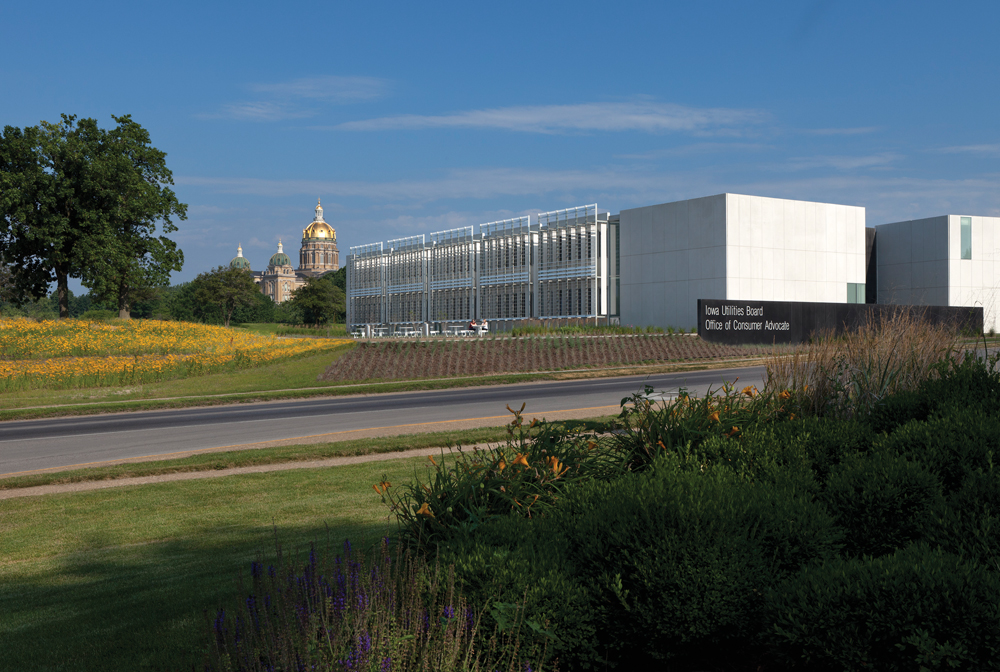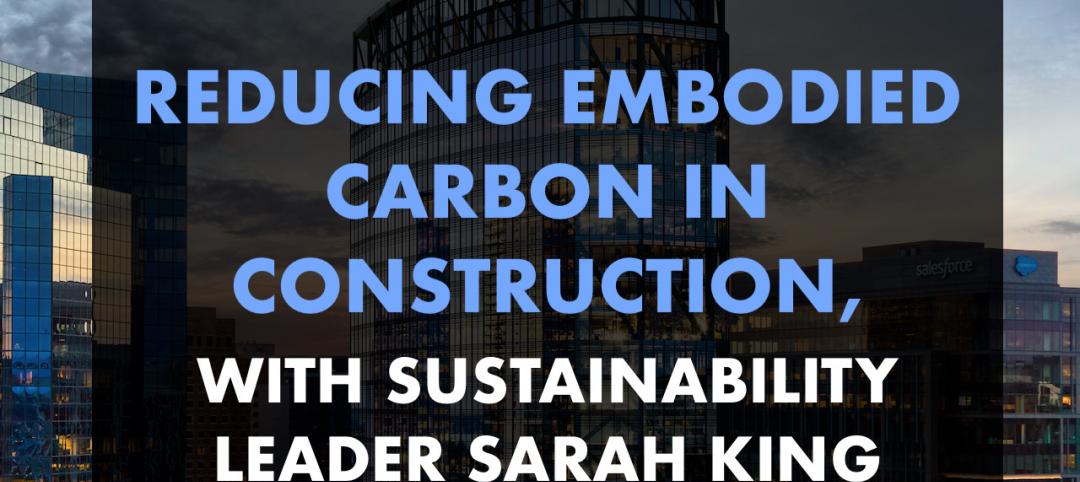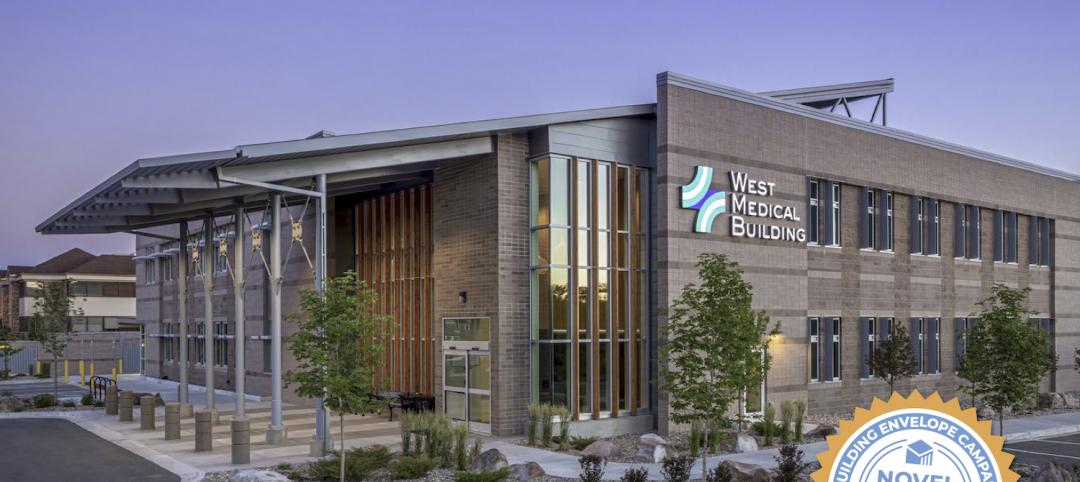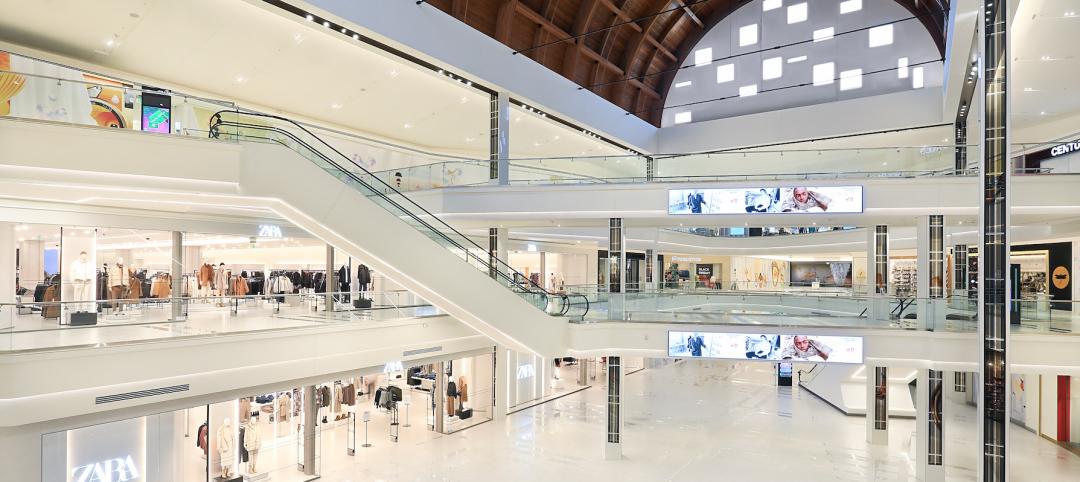With the economy picking up, many stalled government contracts are reaching completion and earning their green credentials. A typical example: 50 United Nations Plaza, in San Francisco. Originally built in 1936, the $121 million renovation—financed from ARRA stimulus funds—is on the way to becoming the first General Services Administration historic renovation to achieve LEED Platinum. The 350,000-sf building will become GSA’s Region 9 headquarters.
Other federal projects are a bit more offbeat. For example, the newest land port of entry in the U.S. (there are 167), designed by Julie Snow Architects, opened earlier this year in Van Buren, Maine. The 46,516-sf facility should gain LEED Gold certification, thanks to its highly efficient glazing and curtain wall, geothermal heating/cooling, zoned lighting, LED fixtures, occupancy sensors, and solar hot water system.
The port of entry, which replaced a flood-damaged facility, is responsible for 160 miles of the border with Canada. To balance security with surveillance capability, the main work areas are largely clad in glass fritted with a silk-screen pattern that provides both camouflage and glare protection.
WHERE GREEN (NOT ORANGE) IS THE NEW BLACK
Balancing security with sustainability, the Building Team for the 532,147-sf Wake County Detention Center, Raleigh, N.C., earned LEED Silver honors. The facility, which can hold 1,152 inmates, also houses city/county offices and a courtroom. Sustainable features include LED lighting, high-efficiency plumbing (saving 282,000 gal/year), and condensate recovery (another six million gal/yr in water savings).
Ten-hut! AEC firms fall in for military service
The Defense Department is a rich source of revenue for AEC firms like HDR Architecture and Mortenson Construction, which have teamed up on the design-build of a $94.9 million barracks complex for the 13th Combat Aviation Brigade at Fort Carson, Colorado Springs, Colo. The trio of four-story apartment buildings, totaling 370,156 gsf, will be built to LEED Gold standards. Solar walls, solar hot water panels, and PV arrays—which will generate a fourth of the annual energy needs for the building—will make the complex net-zero-energy ready.
At the National Naval Medical Center in Bethesda, Md., the JV design-build team Walbridge/Brasfield & Gorrie has completed the 151,450-sf Naval Exchange and 500-space parking structure. Constructed to antiterrorism/force protection standards, it replaced a much smaller 20-year-old exchange.
Designed by CMH Architects to LEED Gold levels, the Bethesda NEX was built partially into a hillside to take advantage of the earth’s insulating capabilities. A 53,000-sf green roof and extensive stormwater management system provide 11,200 cubic feet of rainwater harvesting. The exchange offers military families grocery and other retail stores, plus a dry cleaner, pharmacy, spa, wine shop, credit union, florist, food court, and optical center.
In Iowa, a new state penitentiary for 800 offenders nearing completion in Fort Madison represents a fundamental shift by the state corrections department toward more humane treatment of prisoners—including more environmentally friendly design.
The 475,000-sf facility uses a thousand or so geothermal wells to provide independent heating/cooling to its eight units. Ample daylighting is provided to inmate cells through a mechanical chase that acts as a tempered buffer zone to the unusually large cell windows.
“From a security viewpoint, this ‘back zone’ allowed us to reduce the thickness of the glass, which saved a lot of money,” says Michael Morman, AIA, LEED AP BD+C, Architect/Project Manager with Shive-Hattery, architect/engineer on the $132 million project. (Also on the Building Team: TOK, owner’s rep; HOK, design architect/engineer; Venture, AOR; The Weidt Group, utility partner; PBA, detention specialist; and the Walsh Group, GC.) “That allowed more windows, more daylighting, and easier maintenance, to get rid of the Alcatraz look.”
To control stormwater on the 42-acre site, the Building Team devised a catchment system that carries runoff to vaults and discharges it under the fence through eight-inch-diameter pipes, making a “Shawshank Redemption” escape impossible. The new prison, which will open early next year, is set to earn Gold under the LEED Campus (v2.2) program.
AIA COTE HONORS—AND MORE
The Hawkeye State is also home to one of the nation’s most energy-efficient new buildings, the Iowa Utilities Board/Office of Consumer Advocate Building, in Des Moines. The 44,500-sf office building not only made LEED Platinum, but also hit an Energy Star rating of 100 on the way to garnering a Top 10 Green Project from the AIA Committee on the Environment.
The $10 million, double-wing building, which opened in March, is projected to have an energy use of 28.0 kBtu/sf/year. Sustainable features include operable windows, six acres of native prairie restoration, stormwater management, water use reduction of 46%, and 12.5% of total energy use supplied by roof-mounted PVs.
Not to be outdone, the City and County of San Francisco Public Utilities Commission recently earned LEED Platinum for its new 13-story, 277,500-sf office building. The $146.5 million project won a Top Ten Plus Project Inaugural Award from AIA COTE. Its carbon footprint is half that of comparable buildings, due in part to a sculpted façade which channels air toward wind turbines that provide power to the building.
Related Stories
Architects | Nov 9, 2021
Download BD+C’s 2021 Design Innovation Report
AEC and development firms share where new ideas come from, and what makes them click.
Architects | Nov 9, 2021
Download BD+C’s 10 Predictions for the Construction Industry in 2022
Our prognostications focus on how AEC firms will streamline and modernize their projects and operations.
Architects | Nov 9, 2021
Pelli Clarke Pelli Architects announces renaming
Founded by Cesar Pelli with partners Fred Clarke and Diana Balmori in 1977, the firm began its legacy as Cesar Pelli & Associates at its first office in New Haven, Connecticut.
Movers+Shapers | Nov 7, 2021
Passage of $1.2 trillion infrastructure bill expected to spur stronger construction activity
AEC firms see federal investment as historic
Architects | Nov 2, 2021
What rugby can teach us about designing the workspace of the future
Two veteran workplace designers offer a sports-based analogy for designing agile spaces to meet the needs of an evolving workforce.
Adaptive Reuse | Nov 1, 2021
CallisonRTKL explores converting decommissioned cruise ships for housing
The rapid increase in cruise ship decommissioning during the last 18 months has created a unique opportunity to innovate and adapt these large ships.
Sustainability | Oct 28, 2021
Reducing embodied carbon in construction, with sustainability leader Sarah King
Sustainability leader Sarah King explains how developers and contractors can use the new EC3 software tool to reduce embodied carbon in their buildings.
Cladding and Facade Systems | Oct 26, 2021
14 projects recognized by DOE for high-performance building envelope design
The inaugural class of DOE’s Better Buildings Building Envelope Campaign includes a medical office building that uses hybrid vacuum-insulated glass and a net-zero concrete-and-timber community center.
AEC Tech | Oct 25, 2021
Token Future: Will NFTs revolutionize the design industry?
How could non-fungible tokens (NFTs) change the way we value design? Woods Bagot architect Jet Geaghan weighs risk vs. reward in six compelling outcomes.
Giants 400 | Oct 22, 2021
2021 Retail Giants: Top architecture, engineering, and construction firms in the U.S. retail building sector
Gensler, CallisonRTKL, Kimley-Horn, and Whiting-Turner top BD+C's rankings of the nation's largest retail sector architecture, engineering, and construction firms, as reported in the 2021 Giants 400 Report.

















